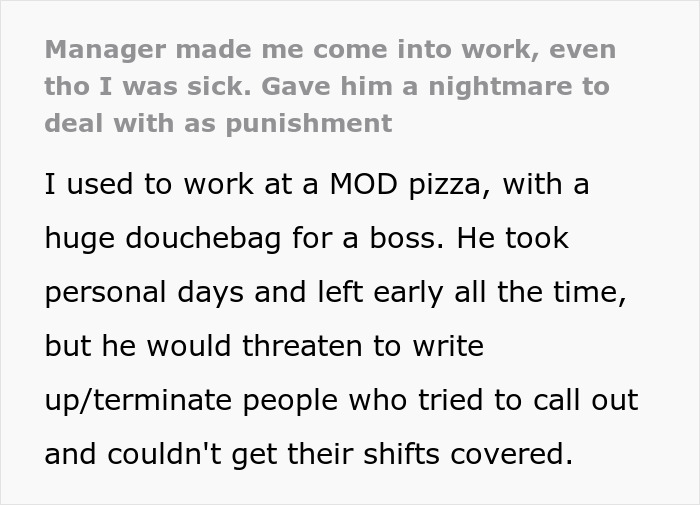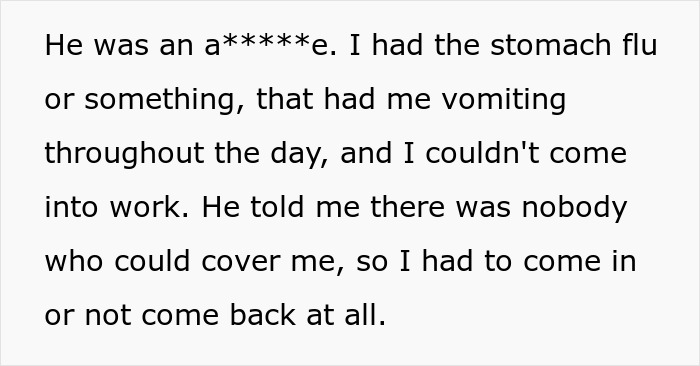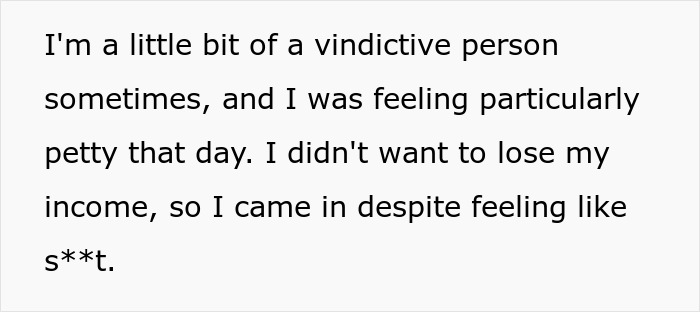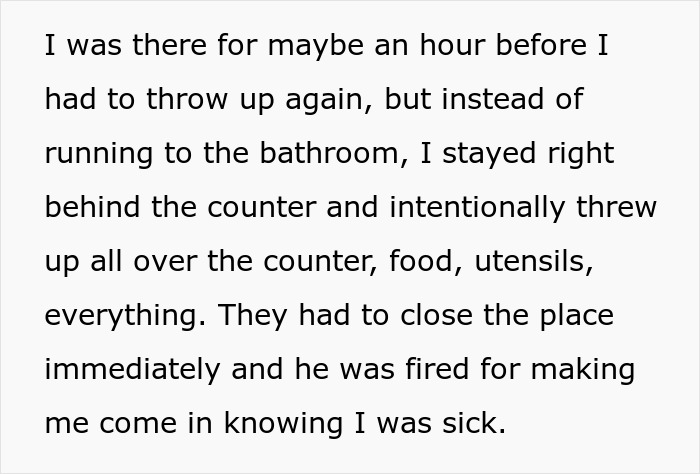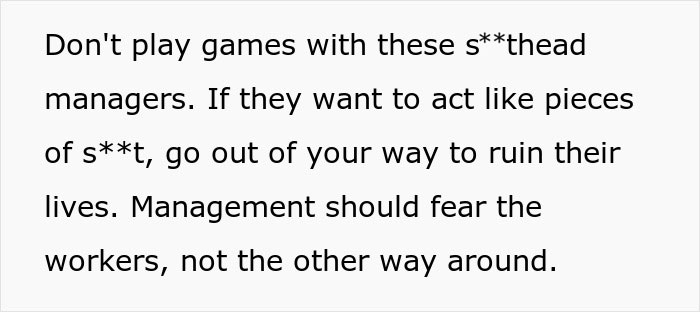Boss Forces Employee To Come In To Work Sick, Regrets It After It Gets Him Fired
If you’re sick—you’re sick. And wishful thinking won’t suddenly make you feel better. You need proper rest to recuperate as soon as possible. You can quickly tell whether someone’s a good workplace leader or not by how they react to their staff getting ill.
Redditor u/MelliniRose recently went viral on the r/antiwork subreddit when she shared how she got revenge against a toxic manager. The man had forced her to come in when she was very severely ill. Read on for the full story. Bored Panda has reached out to the author via Reddit, and we’ll update the article once we hear back from her.
Nobody should be forced to work when they’re ill. They need rest so that they get back on their feet ASAP
Image credits: Anna Tarazevich / Pexels (not the actual photo)
One employee went viral after sharing how her toxic manager’s demands to get her to work when she was sick massively backfired
Image credits: Antoni Shkraba / Pexels (not the actual photo)
Image credits: MelliniRose
Image credits: Sora Shimazaki / Pexels (not the actual photo)
Unfortunately, quite a few managers practice ‘sick-shaming’ in the workplace
A significant portion of workplace ‘leaders’ shame their employees for being sick. According to a resume conducted by Resume Builder, 24% of respondents think workers who take sick days lie or exaggerate their illness.
Around a third of surveyed managers ask for proof of illness. A fifth ‘encourage’ their employees to come to work even when they’re feeling ill. Meanwhile, 11% of respondents admitted to ‘sick-shaming’ their staff.
Employees want to be led by bosses who inspire them and set a good example with their behavior. Indeed states that good managers have excellent communication skills, a great work ethic, and work to inspire their employees.
On top of that, good managers encourage teamwork, do their best to empower everyone and provide the right encouragement and support. In short, they’re supposed to be positive role models who uplift everyone around them, instead of making them dread meeting them.
It’s vital that workers know their rights. If you have any concerns about your boss’ behavior, you should read up on your local labor laws. On top of that, comb your work contract for details that fit your specific situation.
Image credits: Yan Krukau / Pexels (not the actual photo)
Knowing your rights, labor laws, and work contracts is the first step to fighting back against unfair treatment at work
For example, if your manager is pressuring you to work when you’re ill, your best defense is to have airtight proof that what they’re doing is illegal. Find the clauses in your contract that stipulate exactly what happens when an employee falls ill.
Then, bring that information directly to your manager. If this doesn’t get them to change their approach, then go straight to either their boss or your human resources rep. Meanwhile, if you’re a member of a labor union, they might be able to advise you on how best to proceed.
The reality is that nobody can force you to work if you’re ill unless you comply with their demands. However, you might be asked to provide proof (e.g. a doctor’s note).
Working while ill means that the employee’s efficiency is massively reduced. To put it bluntly, they will probably not do a good job; nor will they be resting. Managers are better off allowing their workers to recuperate.
Image credits: Polina Tankilevitch / Pexels (not the actual photo)
It’s impractical and unethical to make someone work while they’re sick
By forcing someone sick to go to work, not only are you prolonging their illness, but you’re also exposing all your other staff members to germs. This means that you might soon find your entire workforce calling in sick.
This leads to lower overall efficiency and worse profits. Not to mention lots of frustration if you’re throwing around threats of firing those who don’t work when they can hardly function.
Let’s also not forget the fact that sick workers can make their customers and clients ill. You do not want to leave your business vulnerable to lawsuits about a lack of hygiene standards just because you cannot find someone else to cover a shift or two.
That’s the practical aspect. The ethical side is that you should not want your customers getting ill in the first place!
The author impressed a lot of internet users. They thought her way of handling the situation was brilliant
[ad_2]
If you’re sick—you’re sick. And wishful thinking won’t suddenly make you feel better. You need proper rest to recuperate as soon as possible. You can quickly tell whether someone’s a good workplace leader or not by how they react to their staff getting ill.
Redditor u/MelliniRose recently went viral on the r/antiwork subreddit when she shared how she got revenge against a toxic manager. The man had forced her to come in when she was very severely ill. Read on for the full story. Bored Panda has reached out to the author via Reddit, and we’ll update the article once we hear back from her.
Nobody should be forced to work when they’re ill. They need rest so that they get back on their feet ASAP
Image credits: Anna Tarazevich / Pexels (not the actual photo)
One employee went viral after sharing how her toxic manager’s demands to get her to work when she was sick massively backfired
Image credits: Antoni Shkraba / Pexels (not the actual photo)
Image credits: MelliniRose
Image credits: Sora Shimazaki / Pexels (not the actual photo)
Unfortunately, quite a few managers practice ‘sick-shaming’ in the workplace
A significant portion of workplace ‘leaders’ shame their employees for being sick. According to a resume conducted by Resume Builder, 24% of respondents think workers who take sick days lie or exaggerate their illness.
Around a third of surveyed managers ask for proof of illness. A fifth ‘encourage’ their employees to come to work even when they’re feeling ill. Meanwhile, 11% of respondents admitted to ‘sick-shaming’ their staff.
Employees want to be led by bosses who inspire them and set a good example with their behavior. Indeed states that good managers have excellent communication skills, a great work ethic, and work to inspire their employees.
On top of that, good managers encourage teamwork, do their best to empower everyone and provide the right encouragement and support. In short, they’re supposed to be positive role models who uplift everyone around them, instead of making them dread meeting them.
It’s vital that workers know their rights. If you have any concerns about your boss’ behavior, you should read up on your local labor laws. On top of that, comb your work contract for details that fit your specific situation.
Image credits: Yan Krukau / Pexels (not the actual photo)
Knowing your rights, labor laws, and work contracts is the first step to fighting back against unfair treatment at work
For example, if your manager is pressuring you to work when you’re ill, your best defense is to have airtight proof that what they’re doing is illegal. Find the clauses in your contract that stipulate exactly what happens when an employee falls ill.
Then, bring that information directly to your manager. If this doesn’t get them to change their approach, then go straight to either their boss or your human resources rep. Meanwhile, if you’re a member of a labor union, they might be able to advise you on how best to proceed.
The reality is that nobody can force you to work if you’re ill unless you comply with their demands. However, you might be asked to provide proof (e.g. a doctor’s note).
Working while ill means that the employee’s efficiency is massively reduced. To put it bluntly, they will probably not do a good job; nor will they be resting. Managers are better off allowing their workers to recuperate.
Image credits: Polina Tankilevitch / Pexels (not the actual photo)
It’s impractical and unethical to make someone work while they’re sick
By forcing someone sick to go to work, not only are you prolonging their illness, but you’re also exposing all your other staff members to germs. This means that you might soon find your entire workforce calling in sick.
This leads to lower overall efficiency and worse profits. Not to mention lots of frustration if you’re throwing around threats of firing those who don’t work when they can hardly function.
Let’s also not forget the fact that sick workers can make their customers and clients ill. You do not want to leave your business vulnerable to lawsuits about a lack of hygiene standards just because you cannot find someone else to cover a shift or two.
That’s the practical aspect. The ethical side is that you should not want your customers getting ill in the first place!
The author impressed a lot of internet users. They thought her way of handling the situation was brilliant
Read original article here

